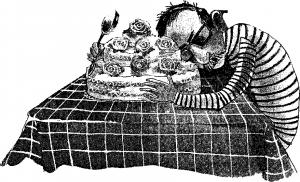Congiuntivo in Italian. Long live the subjunctive mood! Viva il Congiuntivo! Key use cases for Congiuntivo
There is a special type of mood that is used to express one’s emotions, subjective opinion, desire or assumption.
Congiuntivo comes in the following tense forms: Presente (present), Passato (past), Imperfetto (continuous past), Trapassato (pre-past).
These tenses coincide not with the moment of speech, but with the tense that is in the verb of the main sentence.
In order to form the Congiuntivo Presente form, you need to change the endings of the verb to the following:
In verbs I conjugation: parlare - io,tu,lui/lei- parli, noi parliamo, voi parliate, loro parlino.
Non sono convinta che parli la verità. - I'm not sure he's not lying. .
In verbs II and III conjugations: scrivere - io, tu, lui/lei - scriva, noi scriviamo, voi scriviate, loro scrivano; dormire - io, tu, lui/lei - dorma, noi dormiamo, voi dormiate, loro dormano.
Spero che lui scriva oggi un rapporto che io aspetto da una settimana .- I hope that today he will write a report, which I have been waiting for for a week.
Mi pare che loro non dormano ancora. - It seems to me that they are not sleeping yet.
Of course, there are verbs that cannot be conjugated according to the basic rule and form their own forms. These include:
1) Traditional irregular verbs:
essere: io, tu, lui/lei - sia, noi siamo, voi siate, loro siano;
Penso che lui non sia stato sincero.- I think he was not sincere.
avere: io, tu, lui/lei - abbia, noi abbiamo, voi abbiate, loro abbiano;
Questo è il film più stupido che abbia mai visto. - This film is the stupidest I've ever seen.
2) Modal
Verbs that also often do not obey the basic rule:
- potere: io, tu, lui/lei -possa; possiamo; pose; possano.
- volere: io, tu, lui/lei -voglia; vogliamo; vogliate; Vogliano.
- dovere: io, tu, lui/lei - debba (deva); dobbiamo; dobbiate; debbono.
- sapere: io, tu, lui/lei -sappia; sappiamo; sappiate; sappiano.
3) Other verbs
Forming their forms not according to the rule.
- dare: io, tu, lui/lei - dia; diamo; diet; diano.
Spero che Simona dia il farmaco al nostro cane. - I hope Simone will give our dog some medicine.
- dire: io, tu, lui/lei - dica; diciamo; dicate; dicano.
Signora, mi dica qual "anello preferisce? Questo con il brillante o quello con smeraldo? - Signora, will you tell me which ring you chose? With a diamond or an emerald?
- andare: io, tu, lui/lei - vada; andiamo; andiate; vadano.
Speriamo che le cose a Kiev vadano bene. - We hope that everything is fine in Kyiv.
- uscire: io, tu, lui/lei - esca; usciamo; usciate; escano.
Prima che usciate di casa vi farò un baccione. - Before you leave the house I will kiss you . A list of all such verbs is usually provided in the grammar notes in dictionaries.
Main use cases for Congiuntivo:
- The main clause is represented by verbs of feelings or desires, for example - volere, desiderare, preferire, sperare, then Congiuntivo is used in the subordinate clause.
Voglio che il mio marito mi compri una pelliccia. - I want my husband to buy me a fur coat.
- The main clause expresses a request or order - ordinare, pregare, chiedere, permettere, proibire
Mia madre permette che io esca ogni sera. - My mother allows me to go for a walk every evening.
- After verbs expressing doubt or assumption - pensare, credere, dubitare, suporre.
Penso che lei sia già qui. - I believe she is already here. Carla dubita che l "estate prossima riesca ad andare in vacanza.- Carla doubts that she will be able to go on vacation next summer.
- Verbs expressing emotions: essere felice, essere contento, essere lieto, aver paura, temere, essere sorpreso, essere scontento, essere spiacente, essere dolente.
Ho paura che tu arrivi più presto. - I'm afraid that you will arrive earlier than necessary. Sono felice che Laura e Marco si sposino in Maggio. - I'm glad Laura and Marco are getting married in May.
Congiuntivo
When certain verbs and fixed phrases appear in a sentence, we must use Congiuntivo. These include:
- Non sono certo/non sono sicuro(I'm not sure)
- Non sono convinto (I'm not convinced)
- Mi pare/ sembra (It seems to me)
- Direi (I would say)
- Immagino (Imagine)
- Suppongo (I guess)
- E" probabile (Probably), E" improbabile (incredible), E" possibile (possible), E" impossibile (impossible)
Congiuntivo Passato
To form Congiuntivo Passato you need to use the forms of the verbs essere and avere in Congiuntivo presente and Participio passato of the semantic verb. Spero che le lettere siano arrivate.- I hope the letters have already arrived. There are such cases of using Congiuntivo:
- In dependent phrases: Ci dispiace che non abbiamo sentito il tuo concerto ieri. - We are sorry that we didn’t get to your concert yesterday
- When a dependent clause expresses the final goal of an action and is joined by the conjunctions perchè, affinchè
Dovete raccontargli tutto perche lui capisca il vostra problema. - For him to understand your problem, you must tell him everything.
- When a dependent clause expresses a concession and is joined by the conjunctions sebbene, benchè, nonostante che
Laura continua a mangiare molto sebbene lei sia già grassa.- Laura continues to eat a lot, although she is already fat.
- When a dependent clause expresses a condition and there are conjunctions a patto chè, purchè
Comprerò i biglietti a questo concerto a patto chè tu accetti la mia proposta di andarci.- I will buy tickets for this concert on the condition that you accept my offer to go there.
Congiuntivo Imperfetto and Congiuntivo Trapassato
If the subordinate clause is subordinate to the main clause in the past tense, then Congiuntivo Imperfetto and Congiuntivo Trapassato are used. To form Congiuntivo Imperfetto, you need to add the following endings to the stem of the verb:
In I conjugation- parlare: io, tu - parlassi, lui/lei - parlasse; parlassimo; parlaste; parlassero.
- Pensavo che loro parlassero con i cinesi. - I thought they were talking to the Chinese.
For II conjugation - vedere: io, tu - vedessi, lui/lei - vedesse; vedessimo; vedeste; vedessero.
Speravamoche vedessi questo film. - We hoped that you saw this film.
III conjugation- partire: io, tu - partissi; lui - partisse; partissimo; partiste; partissero.
Era necessario che lei partisse fra due settimane. - She had to leave in two weeks.
Verb
Verbavere VCongiuntivo Imperfetto conjugates according to the general rule:
Avere:io, tu -avessi, lui/lei - avesse; avessimo; aveste; avessero.
ERa chiaro che non avessero niente da regalarmi. - It was clear that they had nothing to give me.
Exceptions
But essere is an exception:
Essere: io, tu - fossi, lui/lei - fosse; fossimo; foste; fossero.
Supponevo che lui non fosse il mio fratello.- I admitted that he was not my brother.
Also exceptions are:
Fare: io, tu -facessi, lui/lei -facesse; facessimo; faceste, facesero.
Credevamo che facessimo una sorpresa incredibile. - We believed that we would make an unforgettable surprise.
Dire:io, tu -dicessi, lui/lei - dicesse; dicessimo; diceste; dicessero
Credevo che lei dicesse dove trovare il catalogo. - I trusted that she would tell me where to find the catalogue.
Dare:io, tu - dessi, lui/lei - desse; dessimo; desseste; dessero.
Pensavo che il dottore mi desse qualche medicina. - I thought the doctor would give me some medicine.
Formation of forms
To form the Congiuntivo Trapassato forms, avere / essere (Congiuntivo imperfetto) + Participio passato of the verb are used, which conveys the meaning of the action.
Speravo che ieri la lettera fosse arrivata che aspettavo da molto tempo. - I was hoping that the letter I had been waiting for a long time arrived yesterday.
Let's look at ways to form all forms of Congiuntivo in one sentence:
- Sono felice che i miei genitori tornino dalla vacanza presto. - I'm glad my parents are back early from vacation.
- Ero felice che i miei genitori tornassero...- I was glad that my parents were back...
- Sono felice che i miei genitori siano tornati. - I'm glad my parents are back.
- Ero felice che i miei genitori fossero tornati. - I was glad that my parents were back.
0/5 (total:0)
Use the financial component as a means, but not as an end in itself
- create a “star team”, “betting” on talents
Besides the mission and vision, there is another important reason why we are engaged in the field of online translation. We call it the “root cause” - this is our desire to help children who became victims of war, became seriously ill, became orphans and did not receive proper social protection.
Every 2-3 months we allocate about 10% of our profits to help them. We consider this our social responsibility! The entire staff goes to them, buys food, books, toys, everything you need. We talk, instruct, care.
If you have even a small opportunity to help, please join us! Get +1 to karma;)
Congiuntivo presente is formed from the stem of present tense verbs in Indicativo by adding the following endings for standard verbs of groups I, II and III, respectively:
|
amare - I sp. |
leggere II spr |
finire - III sp. |
partire- III spr. |
|
Congiuntivo presente of auxiliary verbs:
Congiuntivo of some non-standard verbs
Congiuntivo modal verbs
When to use Congiuntivo presente? First, to use this tense, the verb of the main clause must be presente or futuro. (other times will have to be patient for now).
Moreover, not just any verb can appear in the main clause. Compare:
Marco dice che domani viene Laura - Marco says Laura will arrive tomorrow
As you can see, we didn’t need any Congiuntivo, the usual present tense in both parts of the sentence.
So why then "speriamo che non sia finita?"
And then Congiuntivo is used in subordinate clauses if the main clause expresses a wish, doubt, assumption or any emotion:
Sembra che tu sia stanco. It seems like you're tired.
lui crede che tu stia bene. He thinks you're doing well.
E`bene che voi siate arrivati. It's good that we came.
Speriamo che voi veniate da noi. We hope that you will come to us.
Dubito che Mario venga stasera da noi. - I doubt that Mario will come to us tonight.
Suppongo che Lucia dica la verità. - I guess Lucia is telling the truth.
Desidero che il bimbo vada subito a letto. - I wish the child to go to bed immediately.
Temo che Franco e Luciano stiano già a casa. - I'm afraid Franco and Luciano are already at home.
È assolutamente necessario che Mario te lo dica. - It's absolutely necessary that Mario tell you this. (action subsequent to the main one)
Credo che Flavia stia meglio. - I believe that Flavia is better. (action simultaneous with the action of the main sentence)
However, these are not all cases of using Congiuntivo, except for the above emotionally charged examples, Congiuntivo is used in
1) subordinate clauses of the goal, introduced by the conjunctions perche` (so that, in order to) affinche` (so that) etc.:
Ti ho portato il libro perche` tu studi. I brought you a book to help you study.
2) In subordinate clauses introduced by the conjunctions benche` (although), nonostante (despite), sebbene (although), malgrado (despite), Congiuntivo is always used:
Sono venuto da te, benche abbia poco tempo`. I came to you, although I have little time.
Usually, as soon as the topic of the subjunctive mood comes up, Russian-speaking students seem pretty scared. Such a reaction is absolutely natural, because in the Russian language the rules for using the subjunctive mood are completely different. In addition, if you have not mastered Congiuntivo properly, you will not be able to speak Italian correctly and clearly. What a disaster!
But you shouldn’t be too afraid either, you just need to remember the rules for using Congiuntivo and train them properly in practice. Congiuntivo has four forms: Presente, Passato, Imperfetto and Trapassato. Today we will talk about the present tense of the subjunctive mood.
1. Education
1.1 Regular verbs
Regular verbs form Congiuntivo presente by adding endings to the infinitive stem: -i, -iamo, -iate, -ino (for verbs of the first conjugation) and -a, -iamo, -iate, -ano (for verbs of the second and third conjugation) .
Third tense verbs that have -isc in present tense endings indicative mood, in the subjunctive mood have the endings: -sca, -iamo, -iate, - ano.
1.2 Irregular verbs
Essere (to be): io sia, tu sia, lui/lei sia, noi siamo, voi siate, loro siano
Avere (to have): io abbia, tu abbia, lui/lei abbia, noi abbiamo, voi abbiate, loro abbiano
Andare (to walk): io vada, tu vada, lui/lei vada, noi andiamo, voi andiate, loro vadano
Dare (to give): io dia, tu dia, lui/lei dia, noi diamo, voi diate, loro diano
Dire (say): io dica, tu dica, lui/lei dica, noi diciamo, voi diciate, loro dicano
Dovere (to be due): io debba, tu debba, lui/lei debba, noi dobbiamo, voi dobbiate, loro debbano
Fare (to do): io faccia, tu faccia, lui/lei faccia, noi facciamo, voi facciate, loro facciano
Potere (to be able): io possa, tu possa, lui/lei possa, noi possiamo, voi possiate, loro possano
Rimanere (to remain): io rimanga, tu rimanga, lui/lei rimanga, noi rimaniamo, voi rimaniate, loro rimangano
Sapere (to know): io sappia, tu sappia, lui/lei sappia, noi sappiamo, voi sappiate, loro sappiano
Stare (to be, to be): io stia, tu stia, lui/lei stia, noi stiamo, voi stiate, loro stiano
Tenere (to hold): io tenga, tu tenga, lui/lei tenga, noi teniamo, voi teniate, loro tengano
Uscire (to go out): io esca, tu esca, lui/lei esca, noi usciamo, voi usciate, loro escano
Venire (to come): io venga, tu venga, lui/lei venga, noi veniamo, voi veniate, loro vengano
Volere (to want): io voglia, tu voglia, lui/lei voglia, noi vogliamo, voi vogliate, loro vogliano
Certainly, irregular verbs It is better to learn, but at the same time the form Congiuntivo presente can be easily determined by the form Indicativo presente. Note the first person singular and third person forms plural:
2. Use:
When we talk about opinion, assumption, desire, hope, and also express emotions, we always use Congiuntivo in Italian.
Please note that, when talking about an exact fact, Congiuntivo is not used:
Lei dice che lo sa: She says she knows it.
A very important aspect of the use of the subjunctive mood is an order and a request (“I want that”, “I ask you that”, etc.) In this case, we must not forget that these sentences must have two subjects.
—Order, request, wish
Voglio che tu sappia: I I want you to You knew (knew)
Voglio sapere: I I want to know (one subject).
Voglio che tu venga: I I want you to You came (came)
Voglio venire: I I want to come (one subject).
Opinion
Penso che sia così: I think so
Credo che non sia così: I believe that this is not so
— Nadezhda
Spero che tu lo faccia: I hope you do it
Spero che lui passi il esame: I hope he passes the exam
- Emotions
Sono contento che siate qui: I'm glad you're here
Mi dispiace che tu non possa lavorare: I'm sorry you can't work.
Сongiuntivo presente is also used in:
1. In subordinate clauses with conjunctions benché(Although), nonostante(despite), sebbene(Although), malgrado(despite):
Sono venuto da te, benché debba lavorare: I came to you, although I have to work
Nonostante tu non voglia farlo, dovrai: Even though you don't want to do it, you will have to do it.
2. In subordinate clauses, goals with conjunctions perché(in order to, in order to) affinché(so that) acciocche(so that) etc.
Te lo spiego un'altra volta affinché lo capisca: I will explain it to you again so that you understand.
3. With alliances prima che(before), senza che(without) a patto che, purché(with the condition that):
Lo prendono senza che nessuno se ne accorga: He is detained without anyone noticing it (Literally: he is detained without anyone noticing it).
Tornano prima che faccia giorno: They return before dawn.
As you can see, there are not so many rules for using Congiuntivo, the main thing is to remember how it is formed and learn irregular verbs.
And now we present our teacher Serena's Congiuntivo exercise.
We also invite you to join our teachers!
Indicative presente(simple present) is a tense where an action occurs regularly or constantly in the present; in colloquial speech it is also used for actions occurring at the moment of speech and which will occur in the near future.
Io sono una donna. (io sòno una donna) - I am one woman.
Tu sei un italiano. (tu sei un italiano) - You are one Italian.
Lui/lei è malato. (luy/lei e malàto/a) - He/she is sick/sick.
Noi beviamo il vino. (noy bevyamo il wine) - We drink this wine. (can mean both in general and at the moment)
Voi venite Stasera. (voy venite stasera) - You come (come) tonight.
Loro vanno in scuola. (lòro vanno in skòula) - They go (go) to school.
Indicativo passato prossimo(near past) is the tense where the action ended in the near past.
Sono status chiaro? (why is it chiaro?) - (I) was clear (expressed myself clearly)?
Tu sei status al cinema stasera. (tu sei stàto al chinema stasera) - You went to this movie tonight.
Ieri lui/lei è stato/a malato/a. (èri lui/ley e stàto/a malàto/a) - Yesterday he/she was sick/sick.
Il mese scorso noi siamo stati in Italy. (il mèse skòrso noi sàmo stàti in Itàlia) - This past month we visited Italy.
Voi siete statistics fuori adesso? (voy sète stàti fuòri adèsso?) - Were you outside (on the street) just now?
Loro sono gia stati in feria. (lòro sòno ja stàti in fería) - They have already been on vacation.
Indicativo imperfetto(unfinished past) is a tense where an action occurred periodically in the past, its ending cannot be determined.
All"Università io ero un bravo studente. (Al Università io ero un bravo student) - At this University I was one capable student.
Tu eri una bambina tranquilla. (tu èri una bambina tranquilla) - You were one calm girl.
Lui era pazzo di lei. (lui ira pazzo di lei) - He was crazy (went crazy) about her.
Quando noi eravamo giovani... (kuando noi eravamo giovani...) - When we were young...
E voi dove erase? (e howl dove eravate?) - Where have you been?
Loro erano fatty così. (lòro èrano fatti kozi") - They were made like this (were like this).
Indicativo trapassato prossimo(pre-past complex) is the time where the action ended in the past. Used to denote actions that preceded others that also happened.
Io avevo avuto quell"incidente, ero stato male. (io avevo avuto kuel incidentente, ero stàto màle) - I had (suffered) that accident, I was bad (was in bad condition).
Non lo sapevo che eri stato in Italia un po" di anni fa. (non lo sapèvo ke èri stàto in Itàlia un po di anni fa) - (I) didn’t know that (you) visited Italy a little (several) years ago.
Lui/lei era stato/a condannato per diffamazione. (Luy/lei èra stàto/a kondannato/a per diffamats"yone) - He/she was convicted of libel.
Noi c" eravamo stati davvero. (noah cheravamo stàti davvèro) - We actually visited here.
Ci hanno spiegato dove voi erase statistics. (chi anna spiegato dòve voy eravàte stàti) - They explained to us where you were.
Tre bambini sono scomparsi dall"ospedale dove erano statistics ricoverati. (tre bambini sòno skomparsi dalospedàle dove èrano stàti rikoveràti) - 3 children disappeared from this hospital where they were placed.
Indicativo passato remoto(simple past) - this is a time where the action ended in the distant past (several years ago), also often used in literature (fairy tales, etc.)
Io fui molto felice. (io fui mòlto feliche) - I was very happy.
All"epoca tu fosti Un povero giovane. (al"poka tu fòsti un pòvero jòvane) - In this era (that time) you were one poor young man.
Garibaldi fu marinaio, operaio, soldato. (garibaldi fu marinayo, operayo, soldier) - Garibaldi was a sailor, worker, soldier.
Noi fummo da secoli calpesti, derisi, perché non siam popolo, perché siam divisi. (noy fummo da sekoli kalpesti, derizi, perkè non syam pòpolo, perkè syam division) - We have been trampled for centuries, ridiculed, because (we) are not a people, because (we) are divided.
Anche voi foste stranieri. (ànke voi fòste strènèri) - You were also foreigners.
Le dimissioni? Furono una mia scelta. (le dimissyoni? Furono una mia shèlta) - This resignation? (She) became my one choice.
Indicativo trapassato remoto(pre-past) is a tense where an action preceded others that ended in the distant past, often used together with passato remoto to express the order of actions in the past.
Io fui stato nel giardino quando mia madre mi chiamò. (io fui stato nel giardino quàndo mà madre mi kyamò) - I was in this garden when my mother called me.
Non lo sapevo che tu fosti stato malato. (non lo sapovo ke tu fòsti stàto malo) - I didn’t know that you were sick.
Lui/lei fu stato/a in Africa in quell periodo. (luy/lei fu stàto/a in àfrika in kuèl periodo) - He/she was in Africa during that period.
Noi ce ne andammo via solo dopo che fummo stati avvisati. (noy che ne andàmmo via sòlo dòpo ke fummo stàti avvisàti) - We left only after we were notified.
Voi foste statistics bene in quella casa. (voy fòste stàti bene in kuèlla kàza) - You felt good in that house.
Gli spagnoli furono stati Colpiti per primi da questa epidemia. (ly spaniel furono stàti kolpiti per accept da kuèsta epidemic) - These Spaniards were the first to be struck by this epidemic.
Indicativo futuro semplice(future simple) is the time where the action will take place in the future. Also used to express intended action in the present (futuro stilistico).
Io ci sarò domani. (io chi sarò domani) - I’ll be here tomorrow.
Tu sarai un grande medico. (to saray un grande medico) - You will be one great doctor.
Lui/lei sara contento/a di saperlo. (luy/lei sarà contènto/a di sapèrlo) - He/she will be pleased/pleased to know this.
Noi saremo a casa stasera. (noy saremo a kaza stasera) - We will be home tonight.
Voi sarete pronti per le otto? (voy sarète pronti per le òtto?) - Will you be ready for these 8 (h)?
Saranno usciti fuori. (sarànno ushiti fuòri) - (They) may have gone outside (went out).
Indicativo futuro anteriore(future complex) is a tense where an action will already be completed in the future in relation to another action. Also used to express an expected action in the future (futuro anteriore stilistico).
Ti telefonerò appena sarò stato Guarito. (ti telephoner appena sarò stato guarito) - I’ll call you as soon as I’m recovered (recovered).
Sarai stato fortunato... (sarài stàto fortunato) - (You) probably turned out to be lucky (you were lucky)...
Firmeremo il contratto solo quando Sara Stato effettuato il pagamento. (firmermo il contratto sòlo quàndo sarà stàto effettuàto il pagamènto) - We will sign this contract only when this payment is made.
Saremo giudicati secondo quanto saremo stati capaci di seguire questo modello. (sarèmo giudicàti secòndo cuànto saremo stàti capaci di seguire cusèsto modèllo) - We will be judged (evaluated) in accordance with (how much we will be able to follow this model).
Quando tutto cambierà voi sarete statistics una piccola parte di quel cambiento. (quàndo tutto cambierà voi sarète stàti una piccola parte di quèl cambiamènto) - When everything changes, you will (become) one small part of that change.
Un giorno, saranno stati quindici anni fa, io e mia madre stavamo andando a fare spese... (un giorno, saràno stàti quindici anni fa, io e mia madre stavamo andando a fare spese) - One day, perhaps 15 years ago, me and my mother went shopping...
Congiuntivo presente(subjunctive mood of the present tense) is a mood where the action of the present tense is expressed by a subordinate clause (usually after che), it is not a fact, but only an assumption, a wish, the subjective attitude of the speaker.
Tu pensi che io sia cattivo. (tu pensi ke io sia cattivo) - You think that I am bad.
Immagino tu sia contento. (immagino tu sia content) - I imagine (that) you are satisfied.
Dovunque lui sia, tu lo troverai. (dovunkue lui sia, tu lo troverai) - Wherever he is (is), you will find him.
Che siamo felici! (ke siamo felichi!) - So that (we) are (were) happy! (wish)
Potete far domanda dopo che voi siate diventati cittadini. (potète far domànda dopo ke voi siàte diventàti cittadini) - You can make (submit) a petition after (after) you become citizens.
Maledetti siano loro! (maledetti siano lòro!) - Cursed be they!
Congiuntivo passato(subjunctive mood of the nearest past tense) - this mood, where the action of the nearest past tense is expressed by a subordinate clause (usually after che), is not an objective fact.
Spero che io sia stato promosso. (spèro ke io sia stato promosso) - I hope that I have passed (somewhere).
Ho paura che tu sia stato bocciato. (o paura ke tu sia stato bocciato) - I'm afraid that you failed (in the exam, etc.).
Non so se sia stato lui. (non so se sia stàto lui) - I don’t know if (it) was him (was).
È stato un bene che ci siamo stati insieme. (e stàto un bene ke chi syamo stàti insyème) - (it) became something good (good) that here (we) were together.
Don't do it siate statistics voi. (non so dòve siàte stàti howl) - I don’t know where you were.
Pare che da quel momento i due siano stati inseparabili per tutta la durata della visita. (pàre ke da quel momento i due siano stàti inseparàbili per tutta la duràta della visita) - It seems that from that moment these two were inseparable for the entire duration of this visit.
Congiuntivo imperfetto(past incomplete subjunctive) is a mood where the action of the past incomplete is expressed by a subordinate clause (usually after che), or was not an objective fact - in this case it is often used in the main clause Conditional presente.
Se io fossi re... (se io fòsse re...) - If I were a king...
Se tu fossi Qui io non impazzirei per questo amore. (se tu fossi qui ion non impazzire per custo amòre) - If you were here, I would not go crazy with this love.
Avvisami in caso lui/lei fosse già arrivato/a. (avvisami in kazo lui/lei fòsse ja arrivàto/a) - Notify me if (if) he/she has already arrived.
Pensate se fossimo tutti cosi! (pensate se fossimo tutti cosi") - Think if everyone were like that!
Se voi foste Gentili tutto sarebbe più facile. (se voi fòste gentili tutto sarèbbe drink facile) - If you were polite, everything would be easier.
Come se loro fossero il prossimo stadio dell"evoluzione umana. (e kòme se lòro fossero il prossimo stadio dell"evoluzione umana) - (It) is as if they were this next stage of this human evolution.
Congiuntivo trapassato(pre-past subjunctive) is a mood where the action of the ante-past tense is expressed by a subordinate clause (usually after che), or was not an objective fact - in this case it is often used in the main clause Conditional.
Se fossi stato Sicuro che saresti venuto, avrei cucinato anche per te. (se fossi stato sikuro ke sarèsti venuto, avrey cucinàto ànke perte) - If (I) were sure that (you) became the one who came (you will come), I would also cook for you.
Immaginiamo che tu fossi stato molto ricco. (immaginyamo ke tu fossi stato mòlto rikko) - Let’s imagine that you were very rich.
E se fosse stato Lei il traduttore? (e se fòsse stato lei il traduttore?) - What if you were this translator?
Se fossimo statistics creati per la solitudine, saremmo stati dotati della facoltà di abbracciarci da soli. (se fossimo stàti creàti per la solitudine, sarèmmo stàti dotàti della facoltà di abbracciarchi da sòli) - If (we) were created for this solitude, (we) would be gifted with this ability to embrace alone.
Sarebbe stato meglio, se non ci fostestati. (sarèbbe stàto mèlyo, se non chi fòste stàti) - It would be better if (you) weren’t here (you weren’t here).
Peccato, che loro fossero statistics paparazzati insieme. (peccato, que loro fossero stàti paparazzi insieme) - It’s a pity that they were photographed by the paparazzi together.
Conditional presente(conditional present tense) is a mood where the action of the present tense is possible if certain conditions are met (usually expressed in Congiuntivo).
Se l"avessi saputo sarei ancora presidente del Consiglio. (se lavassi saputo sarèy ancora presidente del consiglio) - If (I) had known this, (I) would still be the President of this Council.
Come saresti se fossi nato del sesso opposto? (kòme sarèsti se fossi nato del sesso opposto?) - What (you) would be like if you were born of this opposite sex?
L"origin sarebbe Colpa dal metodo di insegnamento nei primi anni di scuola. (lorigine sarèbbe kòlpa dal mètodo di inseñamènto nei accept ànni di skòòla) - This root cause would be (“is” as an assumption) the fault of this way of teaching in these first years of school.
Senza vivere a Berlino forse io e Dave non Saremmo mai diventati amici. (senza vivere a Berlino forse io e dave non sarèmmo diventàti amici) - Without living in Berlin, maybe Dave and I would never have become friends.
Sareste disposti a firmarlo? (sarèste disposti a firmàrlo?) - (Would you) be ready to sign this?
Sarebbero gli Stati Uniti a finanziare il traffico di migranti africani dalla Libia. (sarèbbero li stàti uniti a financiàre il traffico di migranti africani dàlla Libia) - If there were (probably there are) these United States (those who) finance this movement of African migrants from this Libya.
Conditional passato(conditional mood of the past tense) is a mood where the action of the past tense was possible subject to certain conditions (usually expressed in Congiuntivo trapassato).
Senza mio padre non sarei stato nessuno. (senza mio padre non sarey stato nessuno) - Without my father (I) would not have become anything.
In quale era saresti status più felice? (in kuàle èpoka sarèsti statàto drink Felice?) - In what era (would you) be happier?
Non avevano detto che sarebbe stato facile. (non avevano detto ke sarebbe stato facile) - (They) did not say that it would be easy.
Se ti avessi conosciuto prima, Saremmo stati da dio. (se ti avessi konosciuto prima, sarèmmo stàti da dio) - If I had recognized you earlier, (we) would have been (we would have been) divine.
Sareste statistics promossi se avreste studiato di piu. (sarèste stàti promòsi se avrèste studiàto di pyu) - (You) would have passed (would have passed) if you had studied more.
Come sarebbero statistics i paesi del mondo cinque cento milioni di anni fà? (kòme sarebbero stàti i paèsi del mondo cinque cento miglioni di anni fa) - What would these countries of this world be like 500 million years ago?
Imperativo(imperative mood) is a mood where the performance of an action is commanded by the speaker.
Sii onesto con te stesso. (sii onèsto con te stèsso) - Be honest with yourself.
Commissario, sia coraggioso. (commissario, sia corragiozo) - Commissioner, be brave.
Siamo felici! (Siamo Felici) - Let's be happy! (as desired)
Siate tutti buoni samaritani. (siàte tutti buòni samaritàni) - Be all good Samaritans.
Siano attenti! (siano attenti) - Be careful! (respectfully plural)
Participio presente(present active participle) is an imperfect participle, similar to the Russian language.
Perché vi è, in generale, l" essence e non il nulla? (perkè vi e, in generale, lessente e non il nulla?)
Why is there, in general, this existing (being), and not this nothing (emptiness)?
La scạtola content i fiammịferi. (la scàtola contenènte e fiammiferi) - This box containing these matches.
Participio passato(actual past participle) is a perfect participle, similar to the Russian language.
Il ragazzo, stato in Italia al lungo, imparò l "italiano molto bene. (il ragàzzo, stàto in Italy, imparò litaliano molto bene) - This guy, who stayed in Italy for a long time, learned this Italian very well.
Gerundio(presente) (present gerund) is an imperfect gerund, similar to the Russian language.
Si può fare sport essendo vegetariani. (si può fàre sport essendo vegetariàni) - You can play sports while being a vegetarian.
Gerundio passato(past tense gerund) is a perfect participle, similar to the Russian language.
Christopher Lee essendo stato troppo caratterizzato da Dracula, perse il ruolo di 007. (Christopher Lee, essendo stato tròppo caratterizzato da Dracula, perse il ruòlo di dzero dèro dracula) - Christopher Lee, being too characterized by Dracula, lost this role (agent) 007.
Infinito(presente) (indefinite form) is an impersonal form of imperfect verbs that does not express tense and has no other characteristics.
Essere o non essere, questo è il problema. (Essere o non essere, custo e il problem) - To be or not to be, this is this problem (that is the question).
Infinito passato(indefinite form) is an impersonal form of perfect verbs that does not express tense and has no other characteristics.
Spero di essere stato più chiaro. (spèro di èssere stato drink chiaro) - I hope to become (that I have become) clearer (expressed more clearly).
From: , 1315 visits
Congiuntivo is the mood of a possible action, suspended I depending on the emotional content of the verb in the main sentence. The verb in the main clause can express desire, doubt, fear, assumption, indecision. Even through Congiuntivo, a kind of categoricalness can be expressed, expressing a request, order, desire, desirability of this or that action.
Congiuntivo has two simple tense forms:
1. Congiuntivo presente
2. Congiuntivo imperfetto
And two difficult ones:
1. Congiuntivo passato
2. Congiuntivo trapassato
Congiuntivo times are relative. This means that they correspond not to the moment of speech, but to the time of the verb - the predicate of the main sentence, denoting a simultaneous action, preceding or subsequent to it.
Use of Congiuntivo
1. In independent clauses.
In independent sentences, Congiuntivo is used to express wishes, will:
La pace sia con te! Be in peace!
Abbia pazienza! Have patience!
2. In subordinate clauses.
The most common uses of Congiuntivo are in subject clauses, complementary clauses, subordinate clauses, and modifiers. In subordinate clauses of subjects and additional clauses, Congiuntivo is used if wishes, doubts, assumptions or any emotions are indicated in the main clause:
Bisogna che prendiate una decisione. We need you to make a decision.
Pu? darsi che io venga pi? tardi. It's possible that I'll come a little later.
If the predicate in the main clause is expressed by the verbs parlare, dire, raccontare, etc., the predicate of the subordinate clause is usually expressed by the verb in Indicativo:
Lei parla che questo libro? molto bello.
She says this book is very good.
However, if these verbs are in the negative form, the use of Congiuntivo in the subordinate clause is mandatory:
Lei non parla che questo libro sia molto bello.
She's not saying this book will be all that good.
In subordinate clauses introduced by conjunctions perch? (in order to, in order to) affinch? (so that) etc. Congiuntivo is always used:
Ti ho portato la pizza perch? tu mangi. I brought you pizza for you to eat.
In subordinate clauses introduced by the conjunctions bench? (although), nonostante (despite), sebbene (although), malgrado (despite), always used Congiuntivo:
Sono arrivato da te, sebbene abbia molti impegni.
I came to you, although I have a lot to do.
in subordinate attributives, if they refer to a noun defined by an adjective in the superlative degree or with the words il primo (first), l "unico (only), etc.:
Roma? la pi? grande citt?, che io abbia visitato.
Rome is the biggest city I've ever visited.













